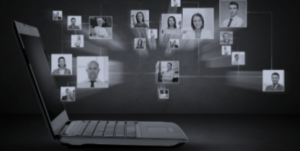We already know that learning is a cognitive process that takes place in a social context:
- learning from, with and because of others [teachers, friends, parents, authors]
- sharing, applying, reacting and socializing our learnings
- unconsciously conforming to societal influences [language, culture, institutions]
And, if we understand the evolution of learning, from story sharing around the fire to elite Socratic philosophical debates to today’s virtual landscape accessible by any and everyone, it’s not hard to see how the focus has shifted away from learning as a social and personal experience to facilitated ‘interaction’ with technology in a new isolated, remote digital world.
In our frenetic response to create scale and commoditize the learning experience, have we over prioritized consistency and on-demand access over social / personal sharing of experiences and meaningful conversations?
When we think about necessary disruption in the learning and development space, are we truly understanding what it is that actually needs disruption?
Communities have and always will be our primary ‘sense-making’ entities. We rely on them to uncover new insights, test out concepts, validate new ways to apply past learning and in general, to make meaning for ourselves in a most ambiguous and complex world.
When I think about learning holistically, I imagine that the art of dialogue; shared meaningful conversation through intentional human interaction, runs parallel to the science of learning, critical reflection, building neural networks, and even memory storage and retrieval. The very concept of neuroplasticity seems to validate that we grow and change cognitively, individually and collectively.
Yet, creating, belonging to, and leveraging diverse learning communities today may not come as naturally to us as we would like to think:
- similarity bias pushes us to collaborate and socialize with others who are more familiar and similar to us, simply reinforcing current thinking
- we perceive the acts of building trust, psychological safety and ultimately relationship, as requiring more time than we care to prioritize in a busy world
- people dynamics are messy, uncomfortable and consume emotional ‘energy’ as we juggle between egoistic controlling of interactions to serve our in-the-moment needs and truly engaging with curiosity and authenticity.
So how do we harness the power of learning communities and the value of ‘Social First’ learning?
We must return to the essence of what it actually means to learn:
- inquiry based interaction, driven by personal curiosity and critical reflection
- prioritizing time and space to slow down, ‘to just think’ and ‘simply be’
- purposely introducing and surrounding ourselves with new, different and strange
- actively seeking out opportunities to partner with others who have opposite skills, experiences and different stories
- creating the conditions for experimentation, failing fast and failing forward
How do we now, thrust ourselves into the discomfort of unlearning? If we inherently prefer the comfort of our learned convictions versus the discomfort of the unknown… what will break the cycle?
How will you unleash your own power of community?
